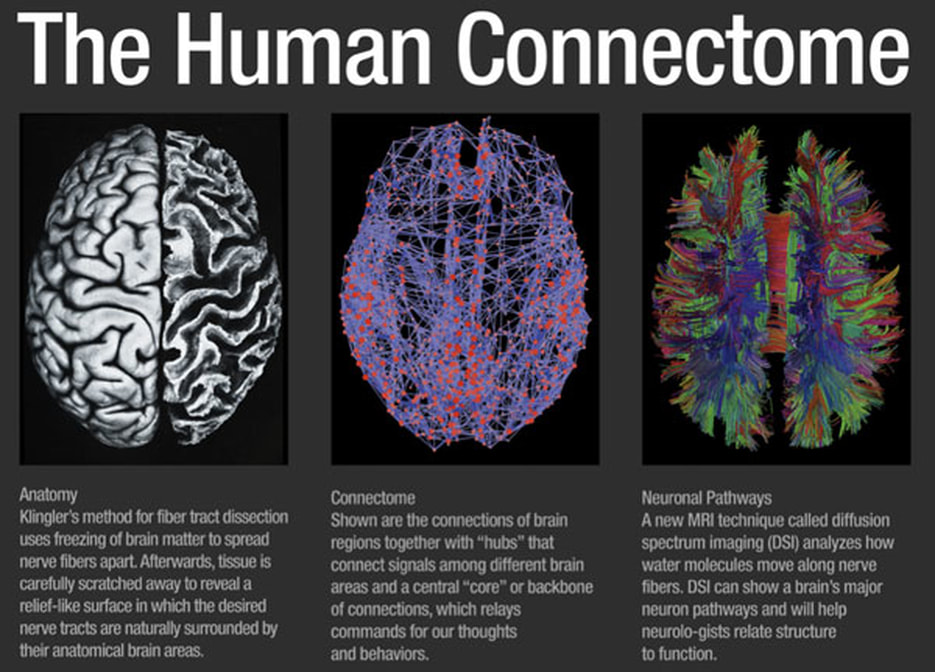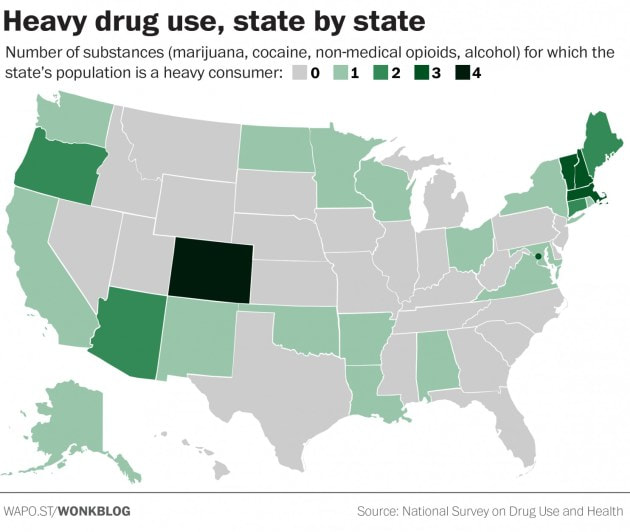Our Scientific Theories Are Changing
|
Holding On To The Old Theories About Mental Illness & Substance Abuse have far more than Benign Consequences. If nothing else, our systems have to admit their ignorance -- and do no further harm.
Both Substance Abuse & Mental Health Seem Connected to Physical Systems, Certainly the Gut and Immune Systems, in Ways That Have NOT Been Previously Appreciated. Our Service Delivery Systems & our Justice Systems are hurting people everyday through ignorance & pretense to knowledge they don't have. The Burden has to be on the Systems NOT on the Person. We can't have a mental health system operating under a scientifically invalid diagnostic manual (the DSM 5) and think it doesn't matter. |
|
National Institute of Mental Health (NIMH): Drug Discovery and Development
Japan's Riken Center for Brain Science finds biomarker for sub-type of Schizophrenia
Mayo Clinic: Bipolar Biomarkers
autism might be an autoimmune disorder
Psycho-neuro-immunology -- below is a new 2019 study involving Autism and the IMMUNE SYSTEM. It is becoming more and more apparent that Neuroscience by itself will not get us to the treatments we need.
The Immune System is a CRITICAL PLAYER and CLINICIANS need a lot more SUPPORT than what they are getting.
The Immune System is a CRITICAL PLAYER and CLINICIANS need a lot more SUPPORT than what they are getting.
“While further research is needed, determining the neuropathology of autism is an important first step to understanding both its causes and potential treatment,” said Anderson, who is Chief of Neuropathology in the Department of Pathology at BIDMC and an Associate Professor of Pathology at Harvard Medical School. |
“With this new research, we haven’t proved causality, but this is one clue in support of the idea that autism might be an autoimmune disorder, just like multiple sclerosis is thought to be,” said Anderson. |
|
Broccoli sprout compound may restore brain chemistry imbalance linked to schizophrenia |
|
Very Interesting & Caution: Still Awaiting Clinical Trials
BBC Cheap and widely used drugs for diabetes and heart health have potential for treating severe mental illness, a study hints. It showed the number of times patients needed hospital treatment fell by up to a fifth when they took the drugs. The researchers at University College London say their findings have "enormous potential". But they, and independent experts, say the results now need to be tested in clinical trials. The starting point for the researchers was a list of currently prescribed medications that science predicts could also help patients with severe mental health disorders. The team focused on:
https://www.bbc.com/news/health-46809517 |
Your browser does not support viewing this document. Click here to download the document.
|
|
|
|
New Science Is Amazing AND It Has HUGE Moral Implications for Our Society:
International Journal of Environmental Research & Public Health (2018)
|
Your browser does not support viewing this document. Click here to download the document.
|
|
Karolinska Institutet in Sweden announces they have identified the Cell Types underlying Schizophrenia. http://news.cision.com/karolinska-institutet/r/cell-types-underlying-schizophrenia-identified,c2526703 KAROLINSKA INSTITUTET & MASS. GENERAL: ANTIBIOTIC MINOCYCLINE INHIBITS THE DEGRADATION OF CONNECTIONS BETWEEN NEURONS. TREATMENT IN ADOLESCENCE CAN BE LINKED TO A REDUCED RISK OF DEVELOPING SCHIZOPHRENIA. |
|
|
More evidence that the "Immune System" is a critical player in mental illness. |
|
|
Korean Researchers Identify Enzyme Important in Bipolar Disorder |
What's A "Functional Brain Connectome?"
|
Decision Making is Shaped by Individual Differences in the Functional Brain Connectome
--Beckman Institute for Advanced Science and Technology at the University of Illinois 19 March 2018 http://neurosciencenews.com/connectome-decision-making-8661/ [S]tudy found that these individual differences are associated with variation in specific brain networks -- particularly those related to executive, social and perceptual processes. https://www.sciencedaily.com/releases/2018/03/180320141334.htm |
Substance Abuse in Colorado & Biological Predispositions for Particular Substances
|
We think there are a lot of factors for Colorado's:
AND it is what it is. BUT it does demand individualized integrated physical and mental healthcare. With substance use our treatments are generally more primitive than our mental health treatments, and that is saying something. Whether one is drawn to alcohol or various other drugs can be very much a matter of biology. See to the right various studies linking substance use to biology as well as our page ---- Drug Addiction Is A Mental Illness The point of this collection of pictures and links is to say ---
|
The Washington Post via The Denver Post
Colorado stands out as the only state which is a top consumer of all four substances [marijuana, cocaine, non-medical opiods, and alcohol]. The state’s heavy consumption of marijuana is predictable given that the drug is legal there. The other three legalization states are heavy consumers of pot, too (Washington, Alaska and Oregon; the latter is also a leader in non-medical use of prescription opioids). But Colorado residents are also heavy consumers of all non-marijuana intoxicants as well. http://www.denverpost.com/2016/05/23/colorado-first-in-drugs-survey/
|
|
Childhood Trauma Can Result in Chronic Inflammation which can affect the Immune System (2012) http://www.medicaldaily.com/childhood-trauma-can-result-chronic-inflammation-241114 |
Elevated Risk for Autoimmune Disorders in Iraq and Afghanistan Veterans with Post-Traumatic Stress Disorder (2014) http://www.biologicalpsychiatry journal.com/article /S0006-3223(14)00457-0/fulltext |
A study from England's University of Manchester has determined that repeat exposure to racial discrimination can have a negative effect on a person's mental and physical health.
http://www.refinery29.com/2016/07/118477/racism-mental-health-study
The Brain-Immune -Gut Triangle: Innate Immunity in Psychiatric & Neurological Disorders
https://www.researchgate.net/publication
/261994663_The_Brain-Immune-Gut_Triangle_Innate_Immunity_in_
Psychiatric_and_Neurological_Disorders
See Also: The Emerging Link Between Autoimmune Disorders and Neuropsychiatric Disease
https://www.ncbi.nlm.nih.gov/pmc/articles/PMC3086677/
What Does The Environment Have To Do With Diseases Affecting The Immune System
https://ensia.com/features/environment-diseases-immune-system/
"Leukine stimulates immune system macrophages, which ingest and dispose of harmful microorganisms and waste products.
"Based on evidence that patients with the autoimmune disease rheumatoid arthritis do not tend to develop Alzheimer’s disease, the investigators first determined that a factor in these patients called “Granulocyte-Macrophage-CSF (GMCSF)” that stimulates production of immune system macrophages might help to protect them from developing Alzheimers.
"That possibility is consistent with recent research suggesting that patients with Alzheimer’s disease may have reduced capacity to clear away amyloid from the brain. GMCSF is the active ingredient in Leukine."
http://www.dana.org/Media/GrantsDetails.aspx?id=38876
"Based on evidence that patients with the autoimmune disease rheumatoid arthritis do not tend to develop Alzheimer’s disease, the investigators first determined that a factor in these patients called “Granulocyte-Macrophage-CSF (GMCSF)” that stimulates production of immune system macrophages might help to protect them from developing Alzheimers.
"That possibility is consistent with recent research suggesting that patients with Alzheimer’s disease may have reduced capacity to clear away amyloid from the brain. GMCSF is the active ingredient in Leukine."
http://www.dana.org/Media/GrantsDetails.aspx?id=38876
Treatable Immune System Disorder Could Be Mistaken For Schizophrenia or Bipolar Disorder
|
Summary: A major finding from researchers at Houston Methodist reveals a significant number of people diagnosed with schizophrenia or bipolar disorder may actually have a treatable immune system disorder.
The condition causes NMDA receptors to stop functioning properly and can result in symptoms commonly associated with neuropsychiatric disorders. Source: Houston Methodist. “We suspect that a significant number of people believed to have schizophrenia or bipolar disorder actually have an immune system disorder that affects the brain’s receptors,” said Joseph Masdeu, M.D., Ph.D., the study’s principal investigator and a neurologist with the Houston Methodist Neurological Institute. “If true, those people have diseases that are completely reversible – they just need a proper diagnosis and treatment to help them return to normal lives.” |
|
Possible linkages between Childhood Trauma -- Inflammation -- Damage to Immune System -- & Ultimate Mental Illness Social Behavior & the Immune System ‘Drain Pipes’ in the Brain: Lymphatic Vessels Act As Pipeline Between Brain and Immune System |
A CU Boulder-led study showing that injecting beneficial bacteria into mice can make them more resilient to stress has been named among the “top 10 advancements and breakthroughs” of 2016 by the nation’s leading non-governmental funder of mental health research. Now, lead author Christopher Lowry, an associate professor in the Department of Integrative Physiology, is moving forward with clinical trials to see if altering the microbiome, or composition of resident bacteria, in military veterans with post-traumatic stress disorder can be beneficial. http://www.colorado.edu/today/2017/01/05/study-linking-beneficial-bacteria-mental-health-makes-top-10-list-brain-research Some Gut Feelings Are A Red Flag
Excerpt from Neuroscience News Scientific and anecdotal evidence suggests a poor diet can cause . .. protective, cautionary signals [from the vagus nerve] to get out of whack, leading to altered mood and behavior. For example, Rinaman [Psychology Professor Linda Rinaman @ Florida State University] said, a high-fat diet can promote a low-grade inflammatory response in the GI tract, changing vagal signals and possibly exacerbating symptoms of anxiety, depression or other disturbed mental states. Rinaman said the types of bacteria within your gut are shaped by your diet, and those bacteria can affect your emotional and cognitive state. “Evidence shows that modifying the diet, perhaps by consuming probiotics, can impact your mood and behavioral state. That’s very clear in animal and human studies,” Rinaman said. “But how does that work? Does it involve the microbiome that you feed in your gut and how those bacteria send signals back to the brain through the vagus nerve? That area of research has exploded in the last few years and, currently, there are many more questions than answers.” Florida State University University of Illinois @ Chicago Paper published in "Physiology" 21 March 2018 http://neurosciencenews.com/gut-emotion-behavior-8682/
|





















